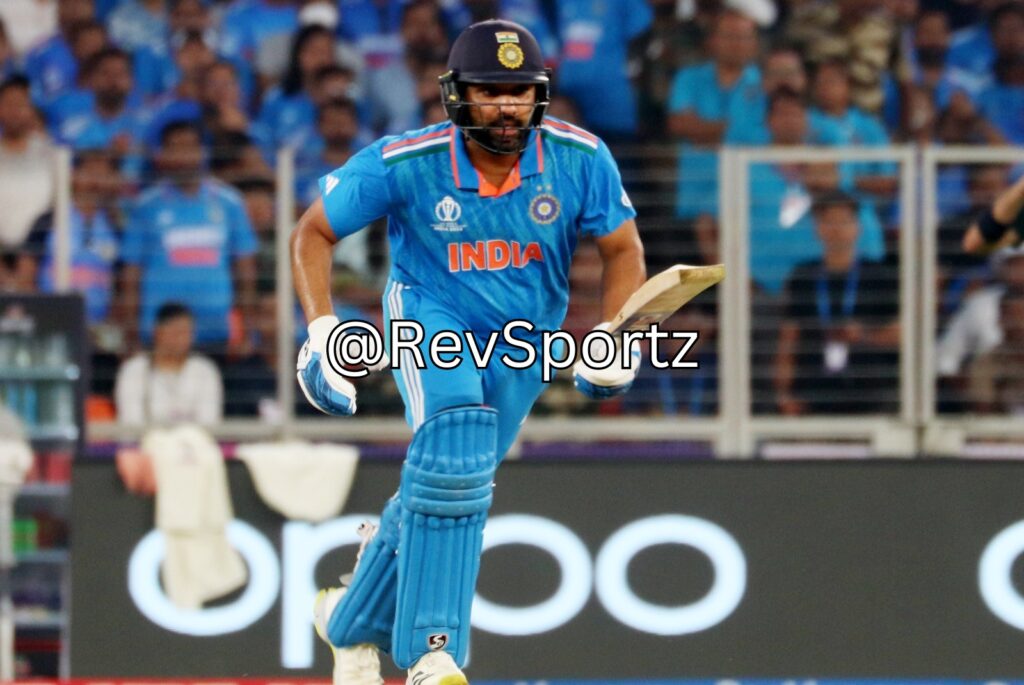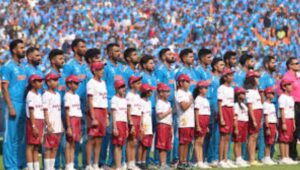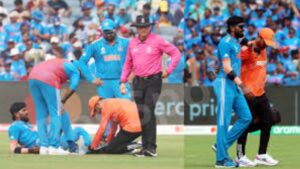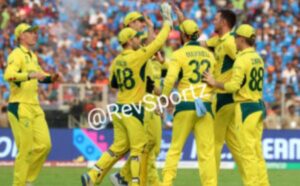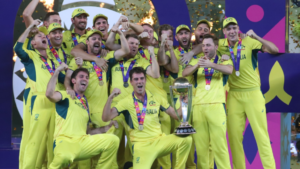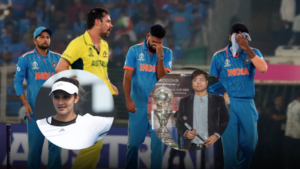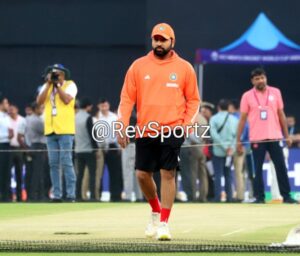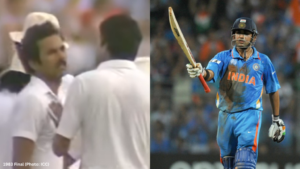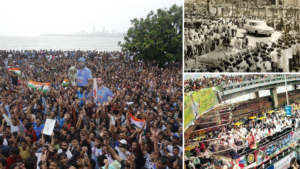Sport is all about leadership. And Indian sport was privileged to witness it last night in two places – Ahmedabad and Mumbai. In Ahmedabad, Rohit Sharma led from the front with his captaincy and his batting in taking down Pakistan. In Mumbai, India put on a show led by Nita Ambani, International Olympic Committee (IOC) member, which witnessed Shri Narendra Modi, the Prime Minister, making a public announcement that India would bid to host the Olympic Games in 2036. But what is most significant is that the Prime Minister did not just mention 2036. He also mentioned that India would bid for the Youth Olympic Games 2029. That stood out for me. YOG is part of the process, the stepping stone to organising the games. By bidding for it, India made a strong leadership statement to the Olympic family across the world.
To Rohit the captain first.
He is one of the most composed members of the Indian team. Always sporting a friendly smile, Rohit is never less than measured. And yet there is a deep commitment to his cause, something that has only intensified in the last few years with Rohit taking over the captaincy in all formats.
Personally speaking, I have seen Rohit evolve as a cricketer and in the process seen him grow as a leader. It was the end of February 2020 and the world hadn’t yet come to terms with the full fury of the Coronavirus. Travel in India hadn’t stopped and masks weren’t a feature of our lives just yet. It was India before Covid-19. Rohit could still walk around his hotel in Bengaluru posing for photographs with fans, and there was a degree of sanity all round. He wouldn’t have to sanitise hands following every handshake and a hug was the norm, and not an exception. In all this ‘normal’, however, there was something that wasn’t.
There was a degree of restlessness in Rohit, which I discovered when I met him for a conversation close to the end of his rehab at the NCA on February 25, 2020. Rohit had hurt his hamstring in New Zealand and was back in India midway through the tour, forced to miss the two Test matches he was so looking forward to playing. He was in red-hot form in the white-ball leg of the tour and had scored five hundreds in the 2019 World Cup, the most by any batsman in a single edition in the tournament’s history. To get injured yet again when in such form was terribly unfortunate.
It was the first time I saw Rohit after that fateful day in Manchester in July 2019, and it was expected that the conversation would turn to the World Cup at some point. “The five hundreds really don’t mean much anymore,” Rohit said in a very matter-of-fact manner.
As he was getting miked up for the interview, a long conversation which wasn’t eventually broadcast because of Covid, Rohit was mumbling something to himself. “World cup jeetna hai. We have three World Cups in the next three years and we must win a world tournament,” he said. “This is one obsession we have to fulfil.”
That’s what it is all about for one of the best of our era. Rohit is a leader and for someone of his calibre, it is never about individual glory. As one of the most successful captains in franchise cricket, Rohit knows how to win. For him to come close multiple times with India and yet not have a world title to show for it in the last decade is not something he can accept. “Unless we win a world title in the next couple of years, I will be very disappointed,” he said.
To understand Rohit, we really need to understand the man’s mind. Only then can you make sense of some of his decisions. For example, it was an easy solution for Rohit to opt out of the 2021 Australia tour. Having won a fifth IPL title with the Mumbai Indians in November 2020, he was the toast of the nation, and speculation was rife if he should replace Virat Kohli as India’s white-ball captain. While it has finally happened and he is indeed the leader, such comparisons have been a social media pastime for months. Having come back to India to tend to his father who was infected with Covid in November 2020, Rohit could have decided to skip the Australia tour, undergo a full fledged rehab at the NCA and be ready for the visit of England in February 2021. It was logical to do so because a 14-day hard quarantine awaited him in Australia if he decided to undertake the travel down under in Covid times. Rohit had not travelled with the team and that meant he would be denied the privileges offered to them. They were moving from one bio secure bubble in the UAE to another in Sydney and, as a result, were allowed to train while serving the mandatory two weeks of quarantine. In Rohit’s case, things were different. He would have to fly a commercial airline and that meant he wouldn’t be allowed to train for 14 days. He would also be confined to a hotel room, which could impact his recovery. In contrast, rehab at the NCA was the more prudent option, for cricket in India was gradually restarting and Rohit could be ready for Test cricket by early 2021.
This is how we tend to think. No so Rohit. “I decided to travel to Australia for that’s what I thought was right,” said Rohit in one of our many conversations during the 14-day quarantine in Sydney. “This is very difficult, I can assure you, and I can also tell you I wouldn’t do this ever again. In fact, no one should have to go through this. It is that hard. Having said that, I am convinced I did the right thing, for my dream is to play Test cricket for India and it is only fair that I live my dream.”
Did failure ever crop up in his mind? Was he not afraid that he would be stepping out to open the batting against the world’s best fast-bowling attack with very little preparation?
And yes, I did ask him the question.
“You can’t pick and choose when it comes to playing for India,” he told me. “As I said before, my dream is to play cricket for India, and that’s what I am doing. If I fail, that’s okay with me but not trying isn’t. That would not seem right. In the end, it is about doing things that you feel are right.”
That’s what he did last night in Ahmedabad. Try. And try hard. To the satisfaction of millions of Indians, he was successful.
The IOC session in Mumbai was always going to be a test. India isn’t an Olympic leader yet. Despite the Asian Games haul of 107 medals, we are still an Olympic minnow. With the world in Mumbai, India needed to step up. Not just in putting together the best forum for dialogue, but also in stating to the Olympic world what it stood for. The fact that the Prime Minister was there to inaugurate the session was a statement that India was serious about its role in the Olympic movement. And then, when he made the bold assertion about 2029 and 2036, it was a significant advance to how the movement has been treated in India. For the longest time, the Olympics came every four years and were followed by a lament that a country of a billion won only two or three medals. That rhetoric is all set to change. With a strong bid for 2029 and 2036, it will stand up to Abhinav Bindra’s prophetic words, “An Olympic Games doesn’t come every four years. It comes every day.” With cricket’s inclusion in the games for LA in 2028, the expansion of the Olympic market in India is secured. And with a significantly bigger footprint, the Olympic movement will now have a base in the global South that it did not have in the past. It is the perfect match, and will only get better going forward.
The post Rohit Leads on the Field, as PM Modi Signals Paradigm Shift in Indian Olympic Movement appeared first on RevSportz | Latest Sports News.
Sport is all about leadership. And Indian sport was privileged to witness it last night in two places – Ahmedabad and Mumbai. In Ahmedabad, Rohit Sharma led from the front…
The post Rohit Leads on the Field, as PM Modi Signals Paradigm Shift in Indian Olympic Movement appeared first on RevSportz | Latest Sports News.

